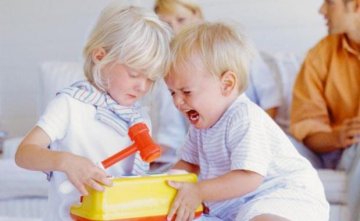What is the reason my child bites?
If your child bites another child, there can be several reasons for this. Mostly because the child is unable to express or tell what he/she needs or wants. If you have built a beautiful house with blocks as a two-year-old, you will, of course, get very angry when a peer breaks your creation. You just haven’t learned yet how to tell someone else what you like or dislike. That is of course very frustrating! And sometimes, children will get physical to express that frustration, and start biting.
Another reason for a child to start biting, is because they start to experiment with biting. For example, the child realizes that biting has consequences: the child that has been bitten, will start crying and the biting child will receive attention from you as a parent or a teacher.
But children also bite because they are teething, because they are bored or get overwhelmed by a situation and don’t know how to deal with it.
Do children bite intentionally to hurt other children?
Young children do not bite to hurt the other person. They bite because it is the most obvious option for them at that time. Sometimes it seems like your child starts biting, when you are not looking. This can be the case. The presence of the parents and the teachers helps the child to follow the rules. So, if you are not there for a while, it is more difficult for the child to remember if something is right or wrong. This is the reason why children often look at their parents or teachers when they are doing something that is not allowed. They check your reaction to know whether what they are doing is good or bad.
Around the second birthday, biting may increase. During this time, it is important to teach children why they should not hurt others. Children will learn how to express themselves through language, this will make it easier to tell what they want or don’t want, and the biting will eventually stop. Children will learn other ways to solve a problem, instead of biting. But in order to learn all these things, the child needs the support and guidance from adults.

How do you react, when a child bites?
A child that has been bitten, often cries loudly, has a red spot on one of the body-parts and sometimes you see teeth marks. This is a difficult situation and it is very understandable that this causes a lot of emotions with both children and parents. However, it is important that you are very aware of your reaction. Because your reaction towards the child that has been biting has a big influence on the whole situation.
Try to avoid to be judgmental or angry towards the child. This may lead to it that the child becomes more anxious and starts biting even more. Set a good example. The way you deal with conflict situations teach children how they can deal with conflicts themselves. When a child bites, you say with a calm voice that biting is not allowed and that it hurts. Try to understand the emotions and do not judge the child. So instead of saying, “You’re naughty because you bite,”. Say, “I see you are very angry / scared / sad, but you shouldn’t bite, biting hurts.”. So do not disapprove the child but disapprove the behavior. After that, focus your attention on the child that has been bitten.
Don’t judge the child
Almost every child bites ones in a while. But sometimes it can happen more often. That doesn’t make this child mean or bad. Never give the child the label of ‘biter’. In this way the child may feel like he is a biter and will show this behavior. Also, others (both adults and other children) may see him or her that way. It’s important to show the child that you are proud of all the positive and good things that the child is doing.
The emotions of a child that has been bitten, are often also observed by other children. It is important to talk with those children as well. By talking about emotions, you can help the children to feel comfortable to talk about their emotions and this, of course, will help to make them feel safe and bring their social-skills to a higher level.
How do you prevent children from biting each other?
Teach children to deal with emotions, by naming the emotions you see: “I see that you are very sad because you cannot play with the car”, “I see that you are very angry because Jan took your puzzle away”. By acknowledging talk about your child’s emotions, he will feel comfortable. Eventually, biting will no longer be necessary, because the child has learned to talk about what he feels. Always focus on and reward the positive behavior, because in that way, they don’t have to bite to get your attention.
True Colors policy
All our teachers know how to deal with biting incidents. Our teachers do not punish the children. Instead of this, focus on and encourage positive behavior and teach them to handle conflicts in a different way and show them how they can talk about their emotions. They do this by setting a good example, reading stories together about biting and create a save environment and offer a lot of activities that will stimulate the social-emotional development of the children.
